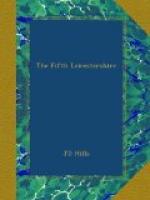Just at this time several changes took place in the personnel of the Brigade and the Battalion. First, Brig.-Gen. G.C. Kemp, R.E., late C.R.E., 6th Division, was appointed our Brigade Commander in place of General Clifford, who left us to take up an appointment in England, having been exactly six months in command. Capt. Bromfield, our Adjutant, whose health had been bad for the past month, was finally compelled to go to Hospital, whence he was shortly afterwards transferred to England. As his assistant, Lieut. Vincent was also away sick, Lieut. Langdale was appointed Adjutant, while 2nd Lieut. C.H.F. Wollaston took the place of Lieut. A.T. Sharpe as machine gun officer, the latter having left sick to Hospital at the end of July. Lieut. Moore sprained his ankle, and 2nd Lieut. R.C.L. Mould went down with fever, both being sent home, and with them went 2nd Lieut. L.H. Pearson, who had severe concussion, as the result of being knocked down by a Minenwerfer bomb. Capt. Bland became 2nd in command with the rank of Major, and Captain R. Hastings and Lieut. R.D. Farmer were now commanding “A” and “C” Companies. Capt. M. Barton, our original medical officer, had come out in June and relieved Lieut. Manfield, who had been temporarily taking his place. We had also one reinforcement—2nd Lieut. G.B. Williams, posted to “D” Company, who the following tour lost 2nd Lieut. C.R. Knighton who sprained his knee. At the same time Serjt. A. Garratt, of “A” Company, became C.S.M. of “D” in place of C.S.M. J. Cooper, who was sent home with fever.
On the 16th August we went once more to the line for a six-day tour, which proved to be the first in which our artillery began to show a distinct superiority to the enemy’s, not only in accuracy but in weight of shell. Several 8” and 9.2” Howitzers appeared in the Salient and, on the evening of the 18th, we carried out an organized bombardment of the lines opposite “50” trench, paying special attention to the neighbourhood of the Minenwerfer. The accuracy of these large Howitzers was surprising, and they obtained several direct hits on the Boche front line, the resulting display of flying sandbags and trench timbers being watched with the utmost pleasure by almost every man in the Battalion. The enemy retaliated with salvoes of whizz-bangs on “50,” and a few on “A6” and “A7,” but did not carry out any extensive bombardment, though, when relieved by the Lincolnshires on the 22nd, we




